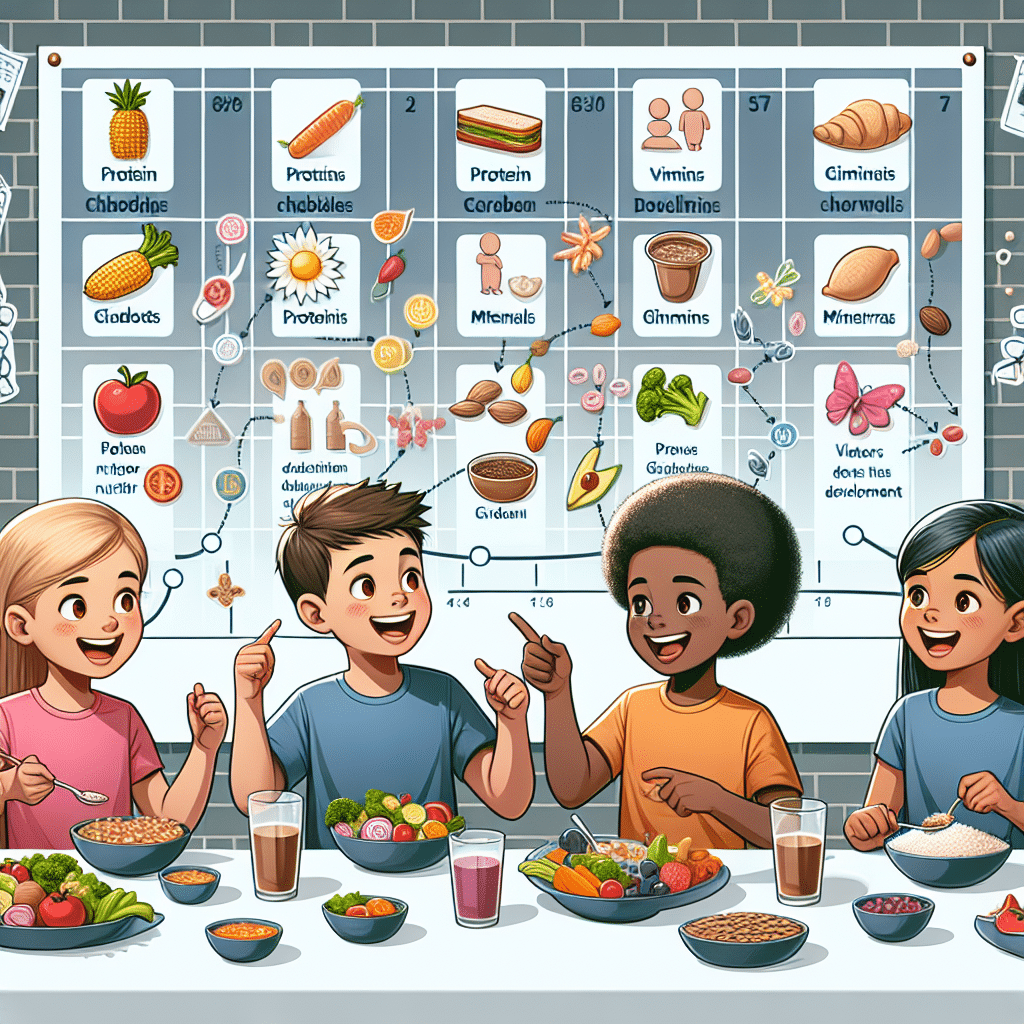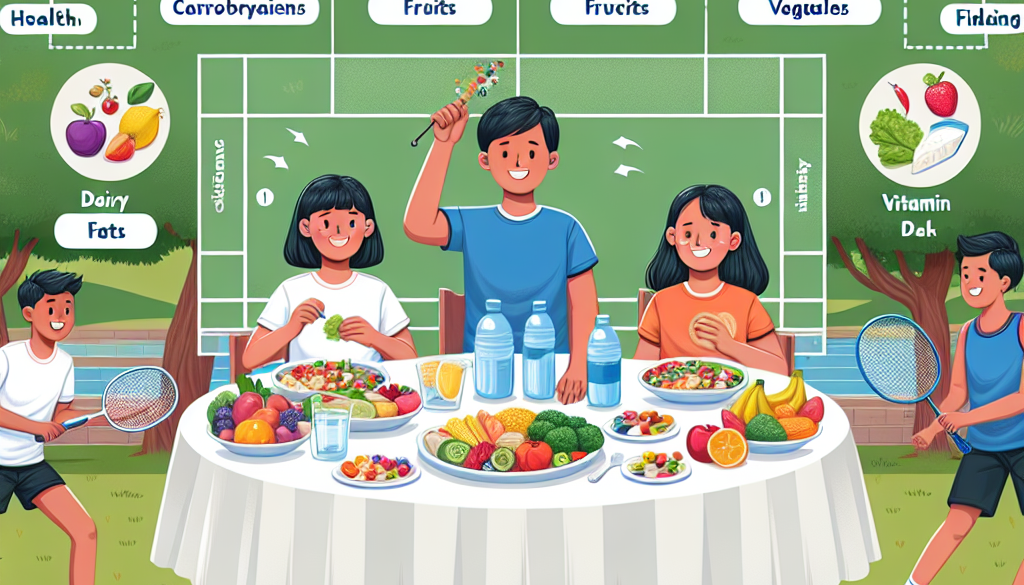Nutrition to Support Optimal Growth and Development in Youth
-
Table of Contents
- Nutrition Essentials for Youth Growth and Development
- Understanding the Nutritional Needs of Youth
- Macronutrients: The Building Blocks
- Micronutrients: Vital for Development
- Challenges in Meeting Nutritional Needs
- Case Studies and Statistics
- Strategies for Improving Youth Nutrition
- Educational Programs and Initiatives
- Family Involvement
- Policy and Environmental Changes
- Role of Protein in Youth Development
- Benefits of Plant-Based Proteins
- Conclusion: Nourishing the Next Generation
- ETprotein: Supporting Youth Nutrition with Quality Protein Products
Nutrition Essentials for Youth Growth and Development

Proper nutrition is the cornerstone of healthy growth and development in children and adolescents. As they transition through various stages of growth, their bodies require different nutrients to support bone development, cognitive function, and overall health. This article delves into the key nutritional components necessary for optimal growth and development in youth, supported by relevant examples, case studies, and statistics.
Understanding the Nutritional Needs of Youth
Children and teenagers have unique nutritional requirements that differ from those of adults. These needs are influenced by rapid physical growth, hormonal changes, and increased energy demands. A balanced diet that includes a variety of nutrients is essential for supporting these developmental processes.
Macronutrients: The Building Blocks
- Proteins: Essential for the growth of tissues, muscles, and organs. Sources include lean meats, dairy, beans, and nuts.
- Carbohydrates: The primary source of energy for growing bodies. Whole grains, fruits, and vegetables are preferred over refined sugars.
- Fats: Necessary for brain development and hormone production. Healthy fats can be found in avocados, fish, and nuts.
Micronutrients: Vital for Development
- Calcium: Crucial for bone health. Dairy products, leafy greens, and fortified foods are rich in calcium.
- Iron: Important for cognitive development and preventing anemia. Red meats, legumes, and fortified cereals are good sources.
- Vitamins: A range of vitamins, including A, B, C, D, E, and K, play roles in vision, energy metabolism, immune function, and more.
Challenges in Meeting Nutritional Needs
Despite the known importance of nutrition, many youths face challenges in meeting their dietary needs. Factors such as busy family schedules, access to unhealthy foods, and personal preferences can lead to nutritional gaps.
Case Studies and Statistics
Research has shown that a significant number of children and adolescents do not consume the recommended amounts of fruits, vegetables, and whole grains. For instance, a study by the CDC found that only 1 in 10 high school students get enough fruits and vegetables. Additionally, the prevalence of childhood obesity, which can be linked to poor nutrition, continues to be a concern globally.
Strategies for Improving Youth Nutrition
Addressing the nutritional needs of youth requires a multifaceted approach that includes education, access to healthy foods, and encouragement of good eating habits.
Educational Programs and Initiatives
Schools and communities can play a pivotal role in educating children and families about nutrition. Programs like farm-to-school initiatives and nutrition classes can increase awareness and foster better food choices.
Family Involvement
Parents and caregivers are influential in shaping dietary habits. Family meals, involvement in food preparation, and setting a positive example are all effective strategies for promoting healthy eating.
Policy and Environmental Changes
Government policies that support access to nutritious foods, such as subsidies for fruits and vegetables or restrictions on marketing unhealthy foods to children, can create an environment conducive to healthy choices.
Role of Protein in Youth Development
Protein is particularly important for youth as it supports the rapid growth and repair of tissues. High-quality protein sources, such as those provided by ETprotein, can be an excellent addition to a young person’s diet.
Benefits of Plant-Based Proteins
Plant-based proteins offer a sustainable and allergen-free alternative to traditional animal proteins. They are rich in fiber and other nutrients and can contribute to a balanced diet for growing children and teenagers.
Conclusion: Nourishing the Next Generation
Optimal nutrition is essential for the growth and development of youth. By focusing on a diet rich in macronutrients and micronutrients, addressing challenges to healthy eating, and incorporating high-quality protein sources, we can support the well-being of children and adolescents. Ensuring that our youth receive the nutrition they need is an investment in their future and the health of our society.
ETprotein: Supporting Youth Nutrition with Quality Protein Products
ETprotein offers a range of organic bulk vegan proteins that are ideal for supporting the nutritional needs of youth. Their products, including rice protein, pea protein, and various seed proteins, provide a neutral taste and are non-GMO and allergen-free. With L-(+)-Ergothioneine purity over 98%, ETprotein’s offerings are suitable for a variety of industries, including sports nutrition and health and wellness products.
For parents and caregivers looking to enhance the diets of their children, ETprotein’s plant-based proteins can be an excellent addition to meals and snacks. Their commitment to quality ensures that you are providing the best for your child’s growth and development.
About ETprotein:
ETprotein, a reputable protein and L-(+)-Ergothioneine (EGT) Chinese factory manufacturer and supplier, is renowned for producing, stocking, exporting, and delivering the highest quality organic bulk vegan proteins and L-(+)-Ergothioneine. They include Organic rice protein, clear rice protein, pea protein, clear pea protein, watermelon seed protein, pumpkin seed protein, sunflower seed protein, mung bean protein, peanut protein, and L-(+)-Ergothioneine EGT Pharmaceutical grade, L-(+)-Ergothioneine EGT food grade, L-(+)-Ergothioneine EGT cosmetic grade, L-(+)-Ergothioneine EGT reference grade and L-(+)-Ergothioneine EGT standard. Their offerings, characterized by a neutral taste, non-GMO, allergen-free attributes, with L-(+)-Ergothioneine purity over 98%, 99%, cater to a diverse range of industries. They serve nutraceutical, pharmaceutical, cosmeceutical, veterinary, as well as food and beverage finished product distributors, traders, and manufacturers across Europe, USA, Canada, Australia, Thailand, Japan, Korea, Brazil, and Chile, among others.
ETprotein specialization includes exporting and delivering tailor-made protein powder and finished nutritional supplements. Their extensive product range covers sectors like Food and Beverage, Sports Nutrition, Weight Management, Dietary Supplements, Health and Wellness Products, and Infant Formula, ensuring comprehensive solutions to meet all your protein needs.
As a trusted company by leading global food and beverage brands and Fortune 500 companies, ETprotein reinforces China’s reputation in the global arena. For more information or to sample their products, please contact them and email sales(at)ETprotein.com today.












